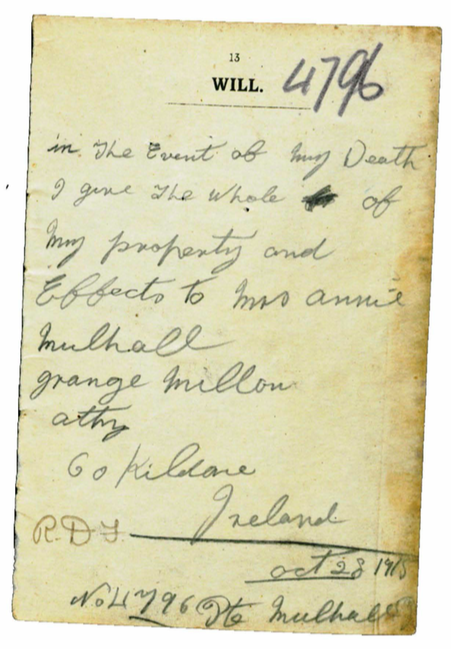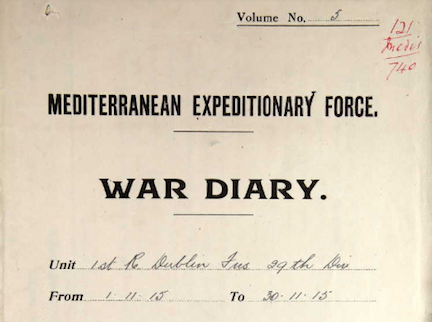I got a good reaction to my recent blog post which centred on my grandfather and how he died in the (so called) Great War. I also had some questions from friends about how I managed to piece together his story, so I thought I’d share that as an interesting abstract exercise in itself.
I should also point out that the ‘war story’ was just a piece of a wider and long term exercise, researching my genealogy and family history. And so this post looks at the wider picture and some sources that I found really useful (so far) in putting the jigsaw pieces together. What happened with my soldier/grandfather Patrick Mulhall was that his short life, because of his army history, was much more documented than other people in my family tree. But in fact his is just one story in the mix. So I guess if you wanted to find out about your own ancestors, the following information and experiences may help you make some progress. It’s ironic that military history is so catalogued, but social history can take a lot more effort.
One huge benefit I did find was that an upsurge of interest in ‘this kind of stuff’, fuelled no doubt by TV programs like ‘Who do you think you are’, has brought a lot more information into the so-called ‘public domain’. I have watched some of those TV programs and I always think they are a bit staged, with the researcher presenting the ‘personality’ with hitherto unknown insights. But I have to acknowledge that they have probably made all this digging easier for the amateur (me) and have given rise to a wealth of ‘pay to view’ online records. Which do – quite honestly – make all this a lot easier. And on that very topic…
Initially (I confess) I was a bit annoyed at the commercial ‘hijacking’ of what I would have taken to be public domain records. But I have now come full circle. I think – for the convenience of the service they provide – the relatively modest fees they charge for access to the material is worth it. And it’s quite a relaxing prospect of a Winter’s evening to sit with a laptop at the kitchen table, make a pot of tea, and spend a few hours doing online research. It does help though to be crisp in searching, because most of the services with an online charge will have a monthly rate you can avail of. So you can – with discipline – get on and off their system in a defined time period, having screenshotted or downloaded most of what you found and wanted to keep. Some services also offer ‘free trial periods’ which are worth checking out, albeit you probably have to give a credit card number and remember in time to cancel the service. But you may choose not to – this stuff becomes addictive. Really.

Handwritten will, 1915
My last tip – label and file everything you download as you do it. There’s nothing worse than a folder full of screenshots whose content you can’t recall. And I guess it’s an obvious tip to keep a spreadsheet, where you can ‘fit in’ the pieces of the family jigsaw as they emerge. Following a trend or timeline also helps. Zone in on a particular family line and chase it back as far as you can get. Sometimes I got distracted by ancillary people and aspects, and I struggled to keep my focus on a particular area or family line. But as I observed above, I now understand how people can become completely consumed by this digging. The trick I think is to keep it in context and try to make progress when you are ‘in the mood for a research session’. And it does take time, if you want to do this (mostly) yourself. The positive is that you do get SUCH a buzz from it, it’d be a shame to let someone else hand it to you on a plate. I still remember the night I found – online – a PDF of my grandfather’s handwritten will which, as a soldier, he had to draw up before he entered the theatre of war. HIS handwriting, online, just there to download. Reproduced above. Talk about goose bumps?
So where did I find information? A lot of the sources listed below are quite basic, and probably any ‘how to find your ancestors’ summary online will suggest them to you as places to look. I can’t recall at this point which ones I read to get me started – it all seems so long ago. And many of these are obviously military-centered resources – only relevant for my particular tributary into WW1 military history. But that’s been an interesting journey in itself. I’m not an expert, and I guess I’m prejudiced by my own experiences. Comments are my own about the sources, but we’re all in the same boat so feel free to disagree.

Service Medals roll record
The main sources of information are below, (these are not hot-links by the way). Also, note that fees are payable for many records, but quite honestly they are pretty reasonable, in my humble opinion.
- Census records of Ireland 1901 and 1911 – really, really useful.
- The Military History file of a soldier – accessed thru Ancestry UK once you have a service number (fee payable)
- The Regimental records of the Battalions of the Royal Dublin Fusiliers he served in – accessed thru the Military section of the British National Archives Record office (Kew) – online – OR thru Ancestry. Fee payable
- The website of the Royal Dublin Fusiliers (RDF) in Ireland – lots of info about WW1 and the Regiment – I’m sure the same exists for other regiments also.
- The RDF archive in Dublin City Archives Pearse St (very little content, sadly). Free
- For all ancestors – Baptism and marriage records in Catholic church parish offices – you really have to visit in person but usually people are very helpful. There is also a microfiche in the National Library in Kildare St, Dublin of parish baptism records pre-1880 (I think) but the quality is terrible in my experience.
- Various online search engines like Genealogy, RootsIreland, findmypast for leads as to civil registration of births, deaths, marriages etc. Some of this stuff is free – it’s a case of feeling your way.
- The County branch of Genealogy Ireland, e.g. for Kildare located in Riverbank, Newbridge. There are fees payable, but again in general it can be worth it. There are people in these locations that are literally founts of knowledge and really helpful.
- The General Record Office, Werburgh St Dublin for Irish civil birth and marriage records. Fees payable but quite reasonable once you know what you are looking for.
- Armed Forces Records (service) that tracks regimental campaigns and movements on an interactive map, with commentary. You have to take a subscription but it’s not too expensive if you get ‘in and out’ quickly.
- There’s a website called ‘The long, long trail’ that’s all about WW1 and seems to be regarded by many people as quite definitive. Free unless you want a private consultation.
- There is a thing called the Great War Forum – effectively it’s a sort of moderated location for people interested in WW1, and you must register to participate (but free). Thereafter you get access to (probably) thousands of people who know incredible amounts of detail about what you are looking for, and are utterly generous in sharing their knowledge. Highly recommended. Multiple angles to WW1 history that you never ever heard of.
- Information about WW1 battles and RDF engagements – online & Wikipedia (obviously). Basically, GOOGLE all angles and keep digging.
- I know this is probably really obvious, but anyone that you can talk to about ‘the past’ like parents, grannies, uncles, aunts etc. is incredibly valuable. Not everything gets catalogued, indexed, put online, even these days.

Front cover of Gallipoli War Diary of RDF
And finally. And honestly. This stuff IS addictive. Make no mistake. So be careful about getting so hung up on what happened in the past that you forget about the present and the future. I think it’s great to know all this stuff, and it IS getting easier. But I don’t want to get so hung up on it that I’d rather spend a day researching than going out on my bike or walking the dog or having lunch with my wife or kids. There’s a cliché somewhere that says something like ‘only the future matters’ (but more eloquently). I’d buy into that…no matter how much the past may intrigue me, and have formed me.